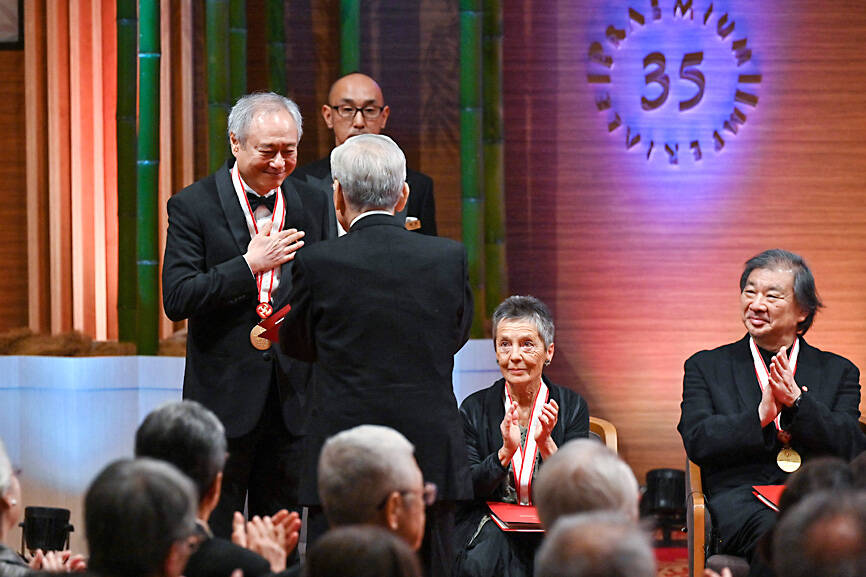Filmmaker Ang Lee (李安) was honored as the first Taiwanese laureate of this year’s Praemium Imperiale, a global arts prize awarded annually by the Japan Art Association, for promoting “the cultures and arts of the world” at an awards ceremony in Tokyo on Tuesday.
Lee, who has won two Oscars for best director, was honored alongside four others by the Japan Art Association, with each receiving a medal from Princess Hitachi at the ceremony.
“Japanese cinema has a long history of cultural influence, especially for Asian filmmakers and I’m no exception. As the first person from Taiwan to receive this award, I’m proud and deeply grateful,” Lee told a news conference in Tokyo on Monday.

Photo: AFP
“Theater is like a temple for me and a movie is a ritual through which we hold a mirror up to our lives and hope to touch the truth,” he said. “I’d like to think that my career is a never-ending school, where I learn about cinema and about myself and about the world. There is no end to that learning.”
Lee was honored in the theater/film category in the 35th edition of the awards ceremony, which is widely considered Japan’s arts equivalent of the Nobel Prize.
He first won an Oscar when Crouching Tiger, Hidden Dragon (臥虎藏龍) was named best foreign film in 2000. He then won best director awards for Brokeback Mountain in 2005 and Life of Pi in 2012.
This year’s laureates also include French conceptual artist Sophie Galle in the painting category, Colombian artist Doris Salcedo in sculpture, Voluntary Architects’ Network founder Shigeru Ban from Japan in architecture and Portugal-born pianist Maria Joao Pires in music.
During the ceremony on Tuesday, Princess Hitachi said the arts are crucial for bringing people together, enriching lives and consoling those caught up in conflicts.
Former Japanese prime minister Fumio Kishida said the Japan Art Association aims to promote world peace through the arts, a wish of the late Prince Takamatsu, who served as the honorary patron of the association for 58 years until early 1987.
On the sidelines of Tuesday’s ceremony, Lee told reporters that Asian voices are important in the film industry when fewer people are going to cinemas, news Web site Japan Forward reported on Wednesday.
“We need to cherish our cultural heritage and speak up in cinema,” he said.
The Praemium Imperiale prize was established in 1988 when the Japan Art Association marked its centennial and in honor of the late Prince Takamatsu, who died the previous year.
Princess Hitachi was installed to succeed his role as the honorary patron.
Six artists “who transcend national and ethnic boundaries” with their “exceptional achievements,” including Chinese-American architect Ieoh Ming Pei (貝聿銘), French film director Marcel Carne, and painters Willem de Kooning and David Hockney received the first edition of the prize in 1989.

A Taiwanese software developer has created a generative artificial intelligence (AI) model to help people use AI without exposing sensitive data, project head Huang Chung-hsiao (黃崇校) said yesterday. Huang, a 55-year-old coder leading a US-based team, said that concerns over data privacy and security in popular generative AIs such as ChatGPT and DeepSeek motivated him to develop a personal AI assistant named “Mei.” One of the biggest security flaws with cloud-based algorithms is that users are required to hand over personal information to access the service, giving developers the opportunity to mine user data, he said. For this reason, many government agencies and

The National Fire Agency on Thursday said a series of drills simulating a magnitude 8.5 earthquake would be held in September to enhance the government’s emergency response capabilities. Since earthquakes cannot be predicted, only by continuously promoting disaster prevention measures could Taiwan enhance its resilience to earthquakes, agency Director-General Hsiao Huan-chang (蕭煥章) said in a news release. The exercises would be held to mark annual National Disaster Prevention Day on Sept. 21, the aim of which is to test Taiwan’s preparedness and improve its earthquake resilience in case of a major temblor, Hsiao said. As part of those drills, an earthquake alert would

DEFENSE: The National Security Bureau promised to expand communication and intelligence cooperation with global partners and enhance its strategic analytical skills China has not only increased military exercises and “gray zone” tactics against Taiwan this year, but also continues to recruit military personnel for espionage, the National Security Bureau (NSB) said yesterday in a report to the Legislative Yuan. The bureau submitted the report ahead of NSB Director-General Tsai Ming-yen’s (蔡明彥) appearance before the Foreign and National Defense Committee today. Last year, the Chinese People’s Liberation Army (PLA) conducted “Joint Sword-2024A and B” military exercises targeting Taiwan and carried out 40 combat readiness patrols, the bureau said. In addition, Chinese military aircraft entered Taiwan’s airspace 3,070 times last year, up about

STRICTER ENFORCEMENT: Taipei authorities warned against drunk cycling after a sharp rise in riding under the influence, urging greater public awareness of its illegality Taipei authorities have issued a public warning urging people not to ride bicycles after consuming alcohol, following a sharp rise in riding under the influence (DUI) cases involving bicycles. Five hundred and seven people were charged with DUI last year while riding YouBikes, personal bicycles, or other self-propelled two-wheelers — a fourfold increase from the previous year, data released by the Taipei Police Department’s Traffic Division showed. Of these, 33 cases were considered severe enough to be prosecuted under “offenses against public safety,” the data showed. Under the Road Traffic Management and Penalty Act (道路交通管理處罰條例), bicycles — including YouBikes and other